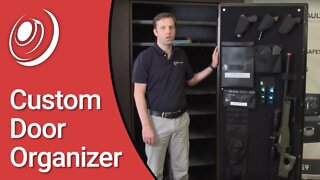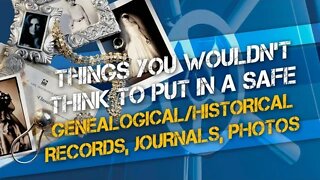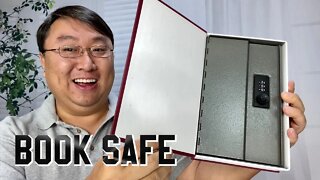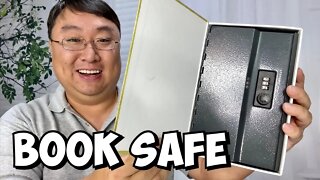Storing Vital And Personal Documents In Your Safe
Even though our world is trying to go paperless, many of our important documents are still recorded on paper. Documents like passports, social security cards, deeds and mortgages, vaccination records, birth certificates, and more, of which can be easily damaged or lost in a fire, flood, theft, or other disasters.
Keeping these documents protected from the wrong hands is the reason you have them in a safe in the first place. But even inside your safe, these documents could be in danger. You need to make sure the humidity and temperature in your safe are controlled. The typical recommendation from librarians and archivists is a low-humidity environment between 30%-50%, and a temperature between 50 and 70 degrees. The lower the humidity and temperature, the better.
Paper records and documents are hygroscopic. This means they absorb the moisture from the air. In many places, this is a serious concern. If you don’t keep the air inside your safe at relatively low humidity, the documents in your safe can experience cracking, curling, bleeding of ink, and in some cases, mildew and mold damage.
Even if you have a good in-home dehumidifier or if you live in a low-humidity place, you may have more humidity around you than you realize. For that added peace of mind, you should always install a dehumidifier in the bottom of your safe to keep the air inside your safe dry.
In addition, stabilizing the humidity levels inside your safe helps protect your other valuables such as metal jewelry, firearms, watches, cameras, and electronics from mold, rust, and corrosion.
A safe with a solid fire rating is an absolute must for protecting your personal records and legal documents. Home fires can reach 1100-1800 degrees Fahrenheit. Depending on how soon the fire department can arrive and put out the fire, your safe may have to withstand minutes or even hours in a literal inferno.
For this reason, Liberty Safe has a wide variety of options with varying levels of security and fire protection. If you want the ultimate protection, go with the Presidential series. They offer 2.5 hours of fire protection at 1200 degrees Fahrenheit. The Lincoln has a rating of 110 minutes, which is just under 2 hours, at 1200 degrees, and even the most budget-friendly Centurion line has 30 minutes of certified fire protection at 1200º F for the 12 and 18 models, and 40 minutes of protection for the 24 models. A room in a home will burn for about 20 minutes and can reach temperatures up to 1500 degrees so I recommend buying the highest rated safe you can afford.
All of Liberty’s fire-protection-rated safes come with Palusol heat-activated door seals that expand to several times their original size to fill any gaps in the space around the door and help protect the interior contents against smoke and heat. A bonus feature is this sealing action can also help protect your valuables from water damage as well. If you’ve ever seen the damage that can result from a house fire, you know that the copious amounts of water necessary to put out a house fire can sometimes cause as much damage as the fire and smoke.
You should look for a fire-resistant safe that comes equipped with high-quality, expanding door seals because your important documents will easily be destroyed nearly instantly if too much water gets inside.
In addition to the fireboard and Palusol expanding door seal, most Liberty Safes come with a Cool Pocket installed on the door panel which will keep anything inside up to 50 degrees cooler during a fire. You can purchase additional Cool Pockets so you can add additional layers of heat protection for your important documents and more while keeping them secure inside your safe.
Scanned digital copies of certain documents are not acceptable for some uses in some situations. Records and items such as driver's licenses, passports, social security cards, and birth certificates will often be required by employers, insurance providers, schools, lenders, and the like, and they will usually specify either “originals” or “official copies.”
However, keeping a digital copy of these items and records securely stored in your safe can still alleviate a lot of headaches if you ever lose your originals. Some numbers and information on the copy may be useful in acquiring an official replacement, and for many uses, such as online data verification, all you need is the numbers or the info from the documents and records, and in that case, a digital copy is still quite helpful.
You should also scan or photograph all your vital paper documents and keep the digital records on multiple, redundant hard drive backups as well as secure cloud-based archives, to cover all your bases.
Your personal documents and vital records should always be secure. Using a Liberty Safe to give you that security is one of the best decisions you could make.
-
 2:21
2:21
Safeandvaultstore
2 years agoSafe & Vault Store Custom Door Organizer
23 -
 7:36
7:36
LibertySafe
2 years agoStoring Genealogy and Historical Documents
2 -
 4:30
4:30
Bannons War Room
2 years agoBannon: Preserve Your Documents
13.8K69 -
 5:56
5:56
Intelligent Talk with Judge Wyld
1 year agoUNCLE INFO How Safe must Business or Government Locks be to Protect and Account for Enterprise Info
311 -
 7:12
7:12
Peter von Panda
3 years agoHide Valuables in a Concealment Book Safe
18 -
 8:37
8:37
Intelligent Talk with Judge Wyld
1 year agoUNCLE INFO Account for Sensitive Documents Missing from Security Custodian Records of Who & When
68 -
 12:48
12:48
Carolinaedcreviews
1 year agoPortable Biometric safe | ONNAIS
13 -
 3:26
3:26
Peter von Panda
3 years agoHow To Store Passwords
15 -
 1:54
1:54
Safeandvaultstore
1 year agoLockdown Safe Accessories
246 -
 6:17
6:17
Peter von Panda
3 years agoThis Book Has A Safe In It!
41